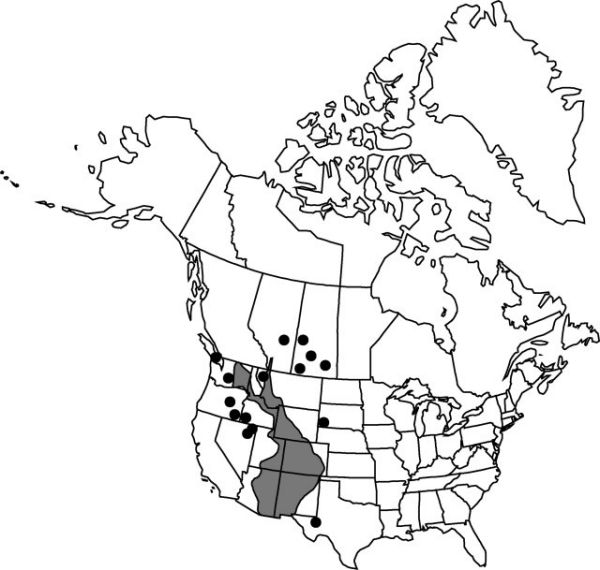Allium geyeri
Proc. Amer. Acad. Arts 14: 227. 1879.
Bulbs 2–10+, not rhizomatous, ovoid or more elongate, 1–2.5 × 0.8–2 cm; outer coats enclosing 1 or more bulbs, gray or brown, reticulate, cells rather coarse-meshed, open, fibrous; inner coats whitish, cells vertically elongate and regular or obscure. Leaves persistent, usually green at anthesis, usually 3–5, sheathing less than 1/4 scape; blade solid, ± straight, flat, channeled, (6–)12–30 cm × 1–3(–5) mm, margins entire or denticulate. Scape persistent, solitary, erect, terete or somewhat 2-angled, 10–50 cm × 1–3 mm. Umbel persistent, erect, compact, 10–25-flowered, hemispheric to globose, not producing bulbils, or 0–5-flowered, largely replaced by ovoid, acuminate bulbils; spathe bracts persistent, 2–3, mostly 1-veined, ovate to lanceolate, ± equal, apex acuminate, beakless. Flowers urceolate-campanulate, (4–)6–8(–10) mm; tepals erect or spreading, pink to white, ovate to lanceolate, ± equal, not withering in fruit and permanently investing fruit, or withering if fruit not produced, midribs papillose, becoming callous-keeled, margins often obscurely toothed, apex obtuse to acuminate; stamens included; anthers yellow; pollen yellow; ovary when present, inconspicuously crested; processes 6, central, low, distinct or connate in pairs across septa, ± erect, rounded, margins entire, becoming variously developed or obsolete in fruit; style linear, ± equaling stamens; stigma capitate, unlobed or obscurely lobed; pedicel becoming rigid and stiffly spreading in fruit, 8–13 mm. Seed coat shining; cells each with minute, central papilla.
Distribution

w North America.
Discussion
Varieties 2 (2 in the flora).
Selected References
None.
Lower Taxa
Key
| 1 | Umbel fully floriferous, not producing bulbils, ovaries mostly all producing seeds. | Allium geyeri var. geyeri |
| 1 | Umbel not fully floriferous, producing 0–5, mostly sterile flowers, flowers mostly replaced by ovoid, acuminate bulbils. | Allium geyeri var. tenerum |